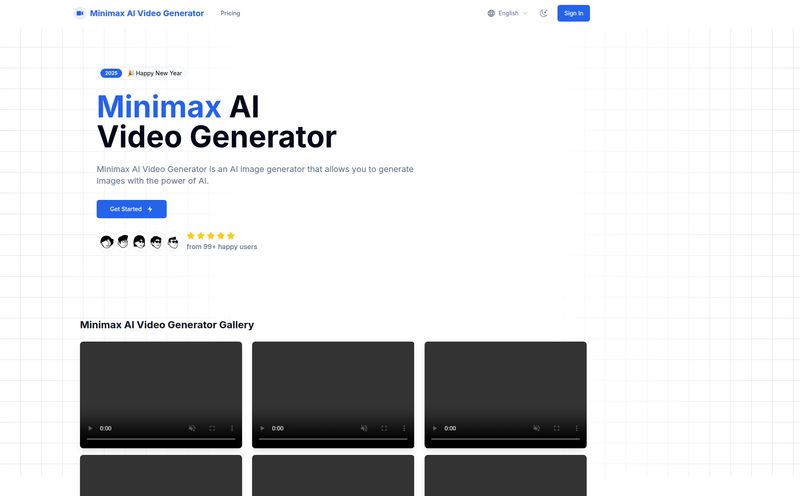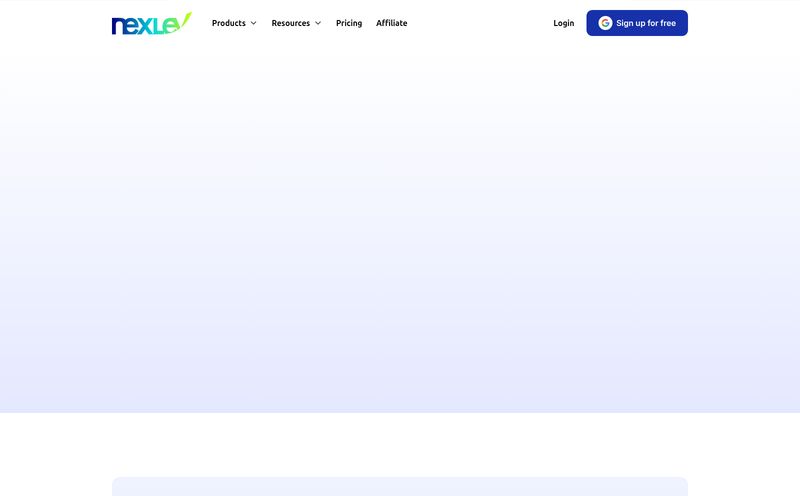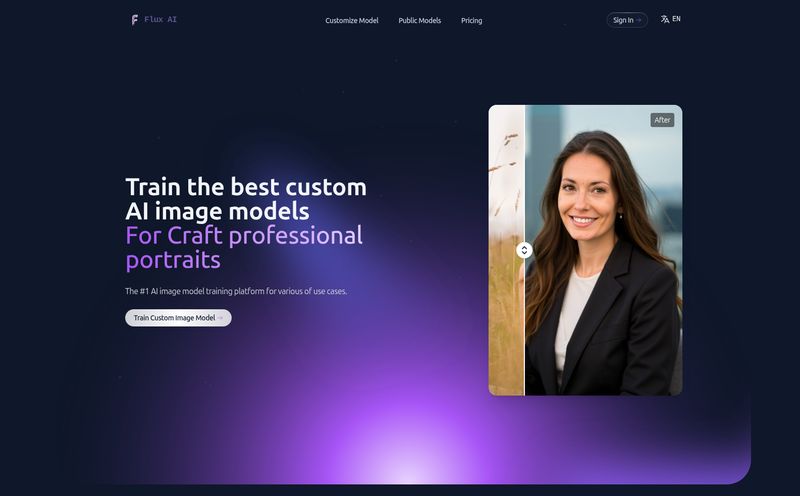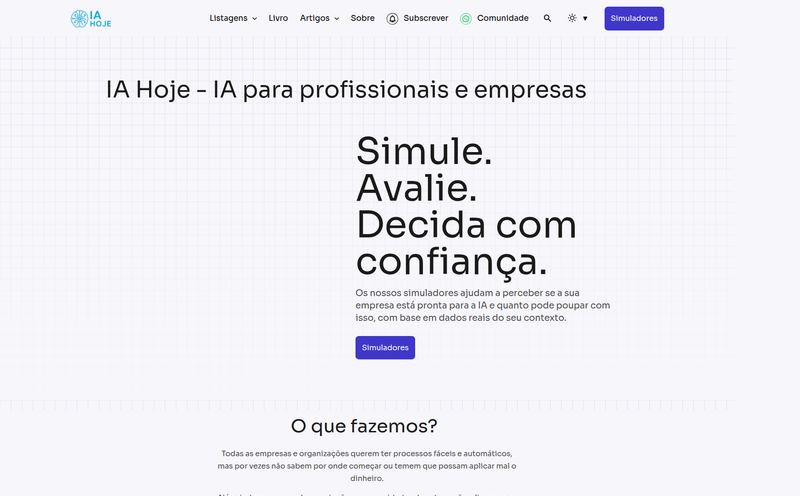As someone who lives and breathes SEO and content, the idea of creating an "online course" can feel... heavy. The endless modules, the clunky Learning Management Systems (LMS), the filming, the editing. It's a whole production. Honestly, the thought of building another big course used to give me a mild panic attack. I've got campaigns to run and traffic to generate, you know?
But the world is shifting towards micro-learning. Bite-sized, easily digestible content that delivers value fast. And that's where I stumbled upon a tool that genuinely piqued my interest: Mini Course Generator. The name itself felt like a breath of fresh air. Not a "Massive University Platform Generator," but a mini course generator. I had to see what it was all about.
So, What Exactly Is This Thing?
Imagine if a PowerPoint deck and an AI assistant had a baby, and that baby was designed specifically for creating slick, interactive learning experiences. That's Mini Course Generator in a nutshell. It's not trying to be Teachable or Kajabi, and that's its biggest strength. This is an authoring tool built for speed and simplicity.
It uses a super simple card-based structure. Each card is like a slide, but you can embed text, images, videos, quizzes, and even collect user information. You build your little course, and then you can share it with a simple link or embed it directly onto your website. No fuss. Its simple, its fast and it just works.
I’ve always felt the biggest hurdle for any lead magnet or free educational content is friction. The more steps someone has to take—create an account, remember a password, navigate a complex dashboard—the more people you lose. Mini Course Generator seems to get this on a fundamental level.
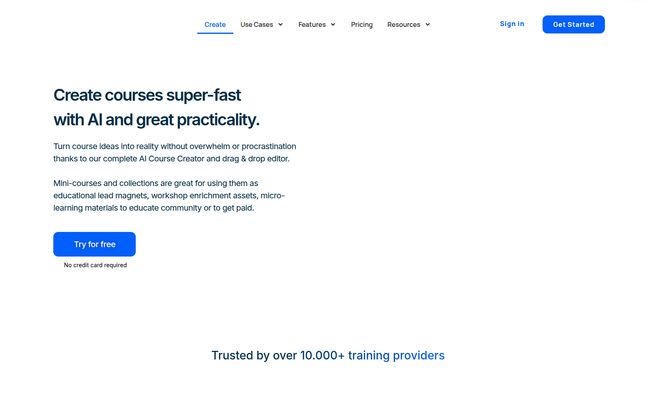
Visit Mini Course Generator
My First Spin and The AI Magic
I signed up for the free plan (more on that later) and decided to test their big claim: AI-powered course creation. The prompt was simple. I typed in "An introduction to technical SEO for bloggers." I hit the button and waited, half-expecting some garbled nonsense.
What I got back a minute later was... surprisingly good. A fully structured mini-course outline with about a dozen cards, covering topics from crawlability and indexation to site speed and structured data. Was it perfect? No. But as a first draft? It was a fantastic starting point that probably saved me a solid hour of outlining and research. It’s like having a junior assistant who does the initial legwork for you. You still need to be the expert who comes in to refine, add your personal voice, and check the facts.
The AI Course Creator in Action
Here’s the thing about the AI: don't think of it as a one-click final product. Think of it as a brainstorming partner. It demolishes writer's block and gives you a structure to build upon. I found myself editing, adding my own anecdotes, and swapping out some of the generic images. The process felt less like creation from scratch and more like a collaboration. For busy professionals, this is a massive win.
The Standout Features That Actually Matter
Beyond the AI, a few other things really stood out to me as an SEO and marketer.
Frictionless Access for Learners
This is the big one. By default, anyone with the link can take your mini-course. No login, no password, no nothing. For a lead magnet, this is gold. You can, of course, add gateways. You can require an email address (hello, list building!), set up a paywall to sell your course, or make it invitation-only. The flexibility is there, but the default is open, which I love.
Sharing and Embedding Everywhere
A course is useless if nobody sees it. MCG makes this dead simple. You get a direct link to share on social media or in your newsletter. Even better, you can grab an embed code and pop the entire course right into a blog post—just like embedding a YouTube video. This turns a standard article into an interactive experience, which can do wonders for engagement metrics like time on page. A definite plus for SEO.
Customization and Professional Polish
On the paid plans, you can connect your own custom domain. So instead of `minicoursegenerator.com/my-course`, it can be `learn.mywebsite.com/my-course`. This is huge for brand consistency. You can also remove the “Made with Mini Course Generator” badge, which is essential for a professional look. It's a small detail, but it makes a big difference.
Who Is This Tool Really For? (And Who Should Pass?)
I've seen a lot of tools that try to be everything to everyone and end up being good at nothing. Mini Course Generator knows its audience.
It's perfect for:
- Marketers creating interactive lead magnets to grow their email list.
- Coaches and Consultants building quick-start guides or pre-workshop materials for clients.
- Community Managers educating their members on new features or best practices.
- HR and Trainers who need to roll out simple onboarding or training modules without the corporate LMS overhead.
However, if you're looking to build a massive, multi-level certification program with complex student progression, graded final exams, and a sprawling community forum, this probably isn't the tool for you. And that’s okay. It’s a scalpel, not a swiss army knife. It's designed for a specific job, and it does that job exceptionally well.
Let's Talk Money: The Pricing Plans
The pricing structure is pretty straightforward, which I appreciate. No hidden fees or confusing credit systems (well, mostly).
| Plan | Price | Best For |
|---|---|---|
| Basic | $0 / month | Trying out the platform. You get 3 mini-courses, which is more than enough to see if it fits your workflow. |
| Pro | $49/mo (or $25/mo annually) | The sweet spot. Unlimited courses, custom domains, no branding, and gateways for lead gen and sales. This is the one for serious users. |
| Elite | $99/mo (or $50/mo annually) | Power users and corporate clients. The big draw here is SCORM export, which allows courses to be used in traditional corporate learning systems. |
My advice? Start with the free plan. It’s genuinely useful. Build a course or two. See how it feels. If you love it and want to use it for your business, the Pro plan is a no-brainer.
The Not-So-Perfect Stuff (A Little Honesty)
No tool is perfect. Here's what you need to know.
The AI credits on paid plans are limited. On the Pro plan, you get 1,000 credits a month. I haven't found exact numbers on how many credits one course uses, but it's something to be aware of if you plan on pumping out AI-generated courses daily. Think of it as a bonus, not an infinite well.
Also, the no-refund policy is a bold move. They state it's due to the high cost of AI operations. While I understand the reasoning, it makes it even more important to use the free plan to its fullest before you put your credit card down. Make sure you're certain.
My Final Verdict: Is Mini Course Generator a Keeper?
Yeah, it is. For me, it solves a very real problem: the need to create high-value, educational content quickly without getting bogged down in tech. It's a fantastic addition to my marketing toolkit. It won't replace my entire content strategy, but it gives me a new, powerful way to engage my audience, capture leads, and provide value.
It has a clear purpose, a clean interface, and a price point that makes sense. In a world of bloated, complicated software, Mini Course Generator is a welcome dose of focused simplicity. It’s a definite recommendation from me for anyone in the content creation space.
Frequently Asked Questions
Can I sell my mini-courses with this tool?
Yes, you can! The Pro plan includes a 'Paywall' gateway. You can connect to Stripe and charge for access to your mini-course directly. It's a simple way to monetize your knowledge without a complex setup.
What kind of content can I add to my course cards?
You have a good range of options. You can include text, images, GIFs, embed videos (from YouTube, Vimeo, etc.), and create interactive elements like quizzes, polls, and short answer questions. It's quite versatile for a 'mini' course creator.
How good is the AI course generation, really?
It's an excellent starting point and outline generator. It's not going to write a perfect, nuanced course in your unique voice. You'll need to edit, add your own expertise, and fact-check it. It's a massive time-saver for the initial drafting phase, not a replacement for a human expert.
Does Mini Course Generator integrate with other marketing tools?
Yes, and this is a key feature. It has native integrations with Zapier and Make. This means you can connect it to thousands of other apps. For example, you could automatically add anyone who signs up for your mini-course to your email list in Mailchimp or ConvertKit.
Is the free plan actually useful or just a teaser?
It's genuinely useful. Being able to create up to three full mini-courses lets you test out the entire creation process, share it, and see if it works for you before spending a dime. It's one of the more generous free tiers I've seen.
What is SCORM and do I need it?
SCORM (Sharable Content Object Reference Model) is a technical standard for e-learning software products. In simple terms, it allows e-learning content to work with different learning management systems. Unless you are creating training for a large corporation that requires you to upload courses into their existing LMS, you probably don't need to worry about the Elite plan's SCORM feature.
